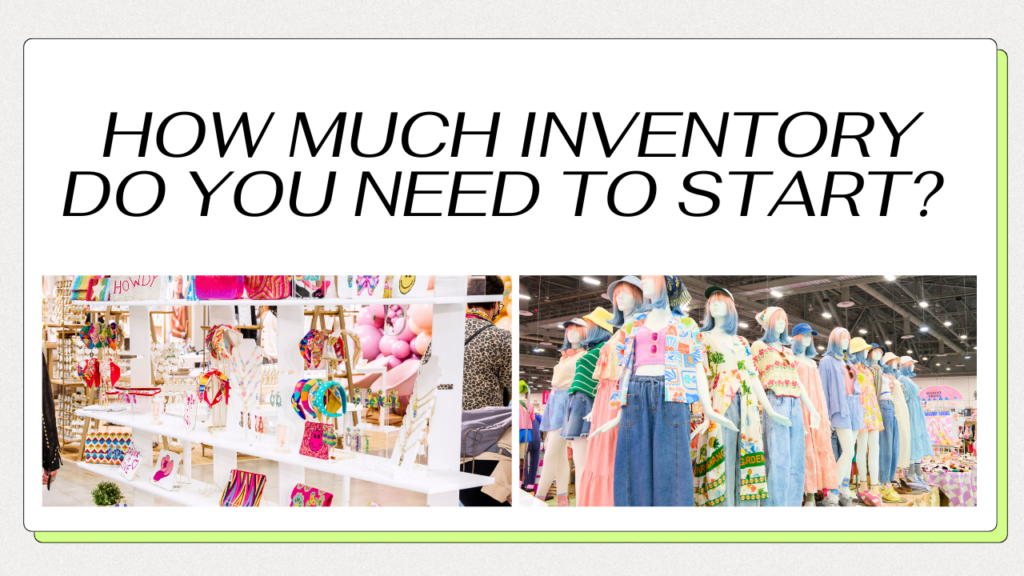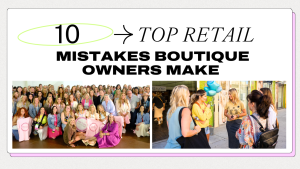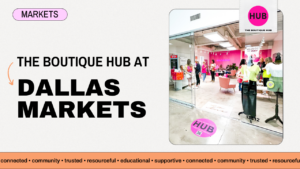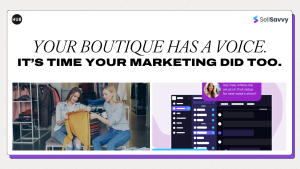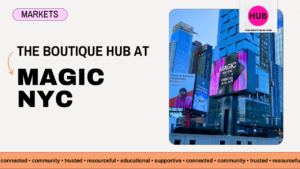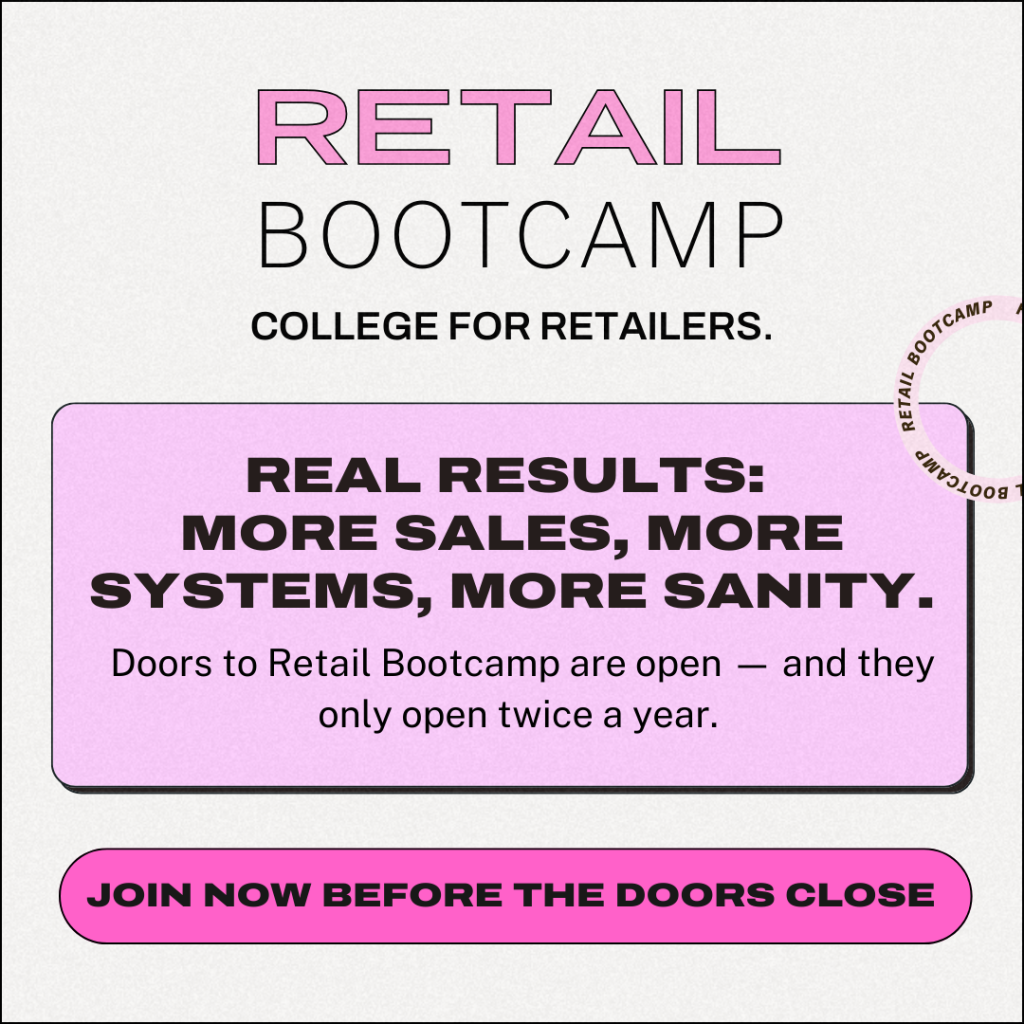Starting a boutique is an exciting venture, but one of the biggest questions new boutique owners face is: how much inventory do I need? The answer isn’t one-size-fits-all, as it depends on your business model, budget, and customer demand. However, having a strategic approach to inventory planning can set you up for success from day one.
Want an in-depth guide on determining the right amount of inventory to start with? Download our FREE guide here: How Much Inventory Do I Need to Start?
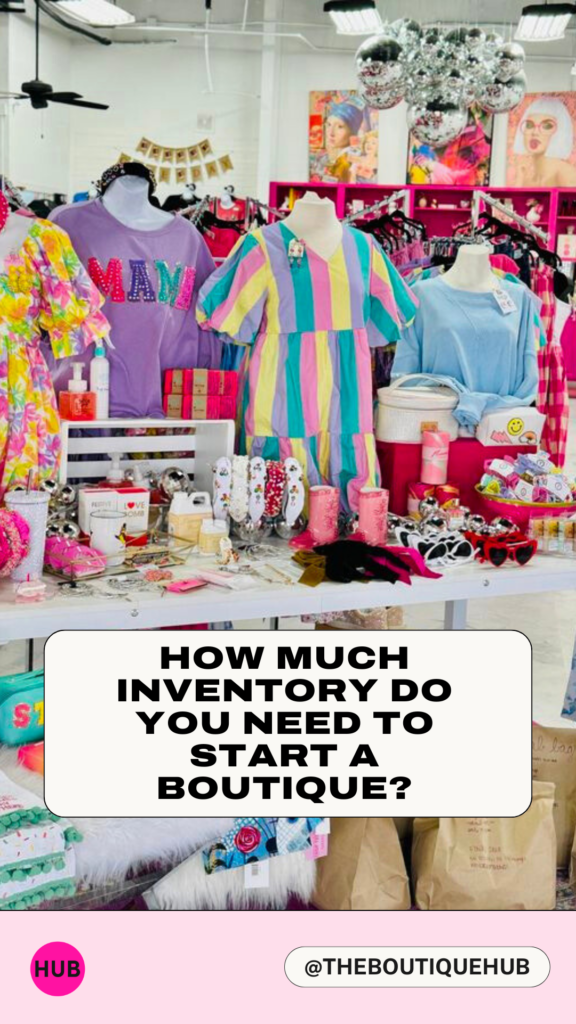
Factors to Consider When Buying Inventory
1. Your Boutique’s Business Model
- Brick-and-Mortar Boutique: If you’re opening a physical store, you’ll need enough inventory to fill your space without overwhelming it. A well-stocked boutique creates an inviting shopping experience, but too much inventory can lead to clutter and excess stock.
- Online Boutique: Without the constraints of a physical location, you can start with a smaller, curated selection. You may choose a pre-order or drop-shipping model to minimize upfront inventory costs.
- Pop-Up Shop or Market Events: If you’re selling at events or pop-ups, your inventory should be tailored to fit the theme, season, and expected foot traffic.
2. Determine Your Inventory Categories
To create a well-rounded boutique collection, start by breaking your inventory into key categories:
- Tops: Blouses, casual tops, sweaters, layering pieces, blazers
- Bottoms: Jeans, skirts, shorts, slacks
- Dresses: Casual, special occasion, seasonal, rompers
- Outerwear: Jackets, coats, vests
- Accessories: Scarves, hats, socks
- Jewelry: Necklaces, rings, bracelets
- Home Decor & Gifts: Candles, stationery, prints, baskets, journals, seasonal items
3. Establish an Inventory Breakdown
Where do you predict your sales to come from? A general rule for new boutiques is that 50% of your inventory should focus on the top half of the body, as these items tend to get more compliments and are easier to sell.
Here’s an example of a starting inventory budget allocation:
- Tops: 50%
- Jewelry: 15%
- Accessories: 15%
- Bottoms: 10%
- Outerwear: 5%
- Home Decor & Gifts: 5%
4. Start with Sales Projections
Estimate your first 3-6 months of sales based on expectations, market research, or similar businesses.
Use this formula to calculate projected monthly sales: Projected Monthly Sales = Average Order Value × Expected Foot Traffic or Online Orders
For example, if you expect 300 transactions per month at an average order value of $50, your projected monthly sales would be $15,000.
5. Determine Your Inventory Investment
Your starting inventory should be 2.5 to 3 times your projected monthly sales to ensure you have enough stock while allowing room for new arrivals.
For example, if your projected monthly sales are $30,000, your initial inventory should be valued at $75,000 – $90,000 at retail price. Depending on your markup, you can then determine your wholesale investment.
How to Avoid Overstocking
Buying too much inventory can tie up your cash flow and lead to markdowns. To prevent overstocking:
- Start with 1-2 packs per style and restock bestsellers.
- Use pre-order or waitlist strategies to gauge interest before making bulk purchases.
- Monitor sales trends and adjust your buying strategy accordingly.
Final Thoughts
Starting a boutique with the right amount of inventory requires a balance between variety and financial sustainability. Begin with a curated selection, track your sales, and adjust as needed. With strategic inventory planning, you can grow a successful boutique that keeps customers coming back for more!
Ready to take the guesswork out of inventory planning? Download our FREE guide here: How Much Inventory Do I Need to Start?
Need help sourcing inventory? Check out Hubventory for exclusive wholesale collections and trending styles perfect for your boutique!
Get more information on growing your business by joining The Boutique Hub where we have tons of training, strategies, and most importantly, connection! Try out our service for a month, cancel anytime.
- 10 Costly Retail Mistakes Boutique Owners Make (And How to Fix Them With Retail Bootcamp)
 Running a boutique business can be one of the most rewarding—and challenging—adventures. Whether you’re just starting your boutique or you’ve been in business for years, it’s easy to fall into common traps that hold your growth back. The good news? You’re not alone—and you don’t have to figure it out on your own either. That’s where Retail Bootcamp comes in. This proven boutique coaching program is designed to help boutique owners like you grow smarter, more profitably, and with a clear plan in place.
Running a boutique business can be one of the most rewarding—and challenging—adventures. Whether you’re just starting your boutique or you’ve been in business for years, it’s easy to fall into common traps that hold your growth back. The good news? You’re not alone—and you don’t have to figure it out on your own either. That’s where Retail Bootcamp comes in. This proven boutique coaching program is designed to help boutique owners like you grow smarter, more profitably, and with a clear plan in place. - Winter Gift & Home Market Roundup: Atlanta, Dallas & Las Vegas
 A Boutique Hub Guide for Gift, Home & Lifestyle Retailers Winter markets are where the buying year truly begins and 2026 is no exception! From gifts and décor to lifestyle and curated home goods, Atlanta, Dallas, and Las Vegas offer three of the most essential winter buying experiences for retailers. Whether you’re a seasoned gift… Read more: Winter Gift & Home Market Roundup: Atlanta, Dallas & Las Vegas
A Boutique Hub Guide for Gift, Home & Lifestyle Retailers Winter markets are where the buying year truly begins and 2026 is no exception! From gifts and décor to lifestyle and curated home goods, Atlanta, Dallas, and Las Vegas offer three of the most essential winter buying experiences for retailers. Whether you’re a seasoned gift… Read more: Winter Gift & Home Market Roundup: Atlanta, Dallas & Las Vegas - The Boutique Hub at the Dallas January Total Home & Gift Show + Apparel, WESA + AETA
 The time has come for Dallas Market and the Hub team couldn’t be more excited! We know how busy market days can be so we wanted to make sure you guys are filled in on our schedule so you can come and stop by!
The time has come for Dallas Market and the Hub team couldn’t be more excited! We know how busy market days can be so we wanted to make sure you guys are filled in on our schedule so you can come and stop by! - Your Boutique Has a Voice. It’s Time Your Marketing Did Too.
 “Your boutique already has a voice customers trust. SellSavvy helps you make sure your marketing finally sounds like it.” Your audience doesn’t need more noise — they want more you. They want connection, personality, and that one-on-one feel that made them fall in love with your brand in the first place. SellSavvy helps you deliver that at scale, turning every customer interaction into an opportunity to sell smarter — not louder.
“Your boutique already has a voice customers trust. SellSavvy helps you make sure your marketing finally sounds like it.” Your audience doesn’t need more noise — they want more you. They want connection, personality, and that one-on-one feel that made them fall in love with your brand in the first place. SellSavvy helps you deliver that at scale, turning every customer interaction into an opportunity to sell smarter — not louder. - The Boutique Hub at MAGIC NYC
 The Hub Team is heading to MAGIC New York again and we couldn’t be more excited! With over 320+ brands, you are sure to find more MAGIC in a (New York) minute!
The Hub Team is heading to MAGIC New York again and we couldn’t be more excited! With over 320+ brands, you are sure to find more MAGIC in a (New York) minute!
